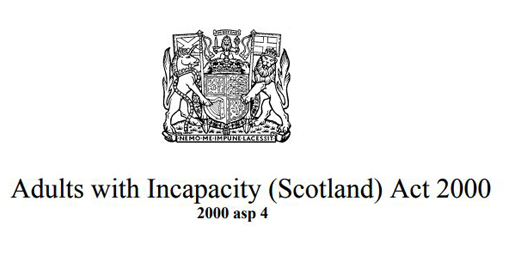2.2 Mental capacity in Scotland
The principles of the legislation in Scotland and Northern Ireland are set out below. As you read through them, bear in mind two points that also apply to the Mental Capacity Act for England and Wales:
- Respect for personal autonomy. This means that if a person has the mental capacity to make a decision, including decisions on their health, welfare and finances, this decision should be respected.
- All adults are assumed to be capable of making decisions. This assumption can only be reversed on evidence of a lack of capacity. Adults do not have to prove capacity or have it certified. Rather, it falls to the person questioning a person’s capacity to establish lack of it.

Section 1 of the Incapacity (Scotland) Act 2000 contains a set of general principles that apply to the whole act.
Box 2 Principles of the Incapacity (Scotland) Act 2000
Principle 1: Benefit
There shall be no intervention in the affairs of an adult unless the person responsible for authorising or effecting the intervention is satisfied that the intervention will benefit the adult and that such benefit cannot reasonably be achieved without the intervention [s.1(2)].
Principle 2: Minimum intervention
Where it is determined that an intervention [in the affairs of an adult under or in pursuance of the Act] is to be made, such intervention shall be the least restrictive option in relation to the freedom of the adult, consistent with the purpose of the intervention [s.1(3)].
Principle 3: Take account of the wishes of the adult
In determining if an intervention is to be made and, if so, what intervention is to be made, account shall be taken of –
… the present and past wishes and feelings of the adult so far as they can be ascertained by any means of communication, whether human or by mechanical aid (whether of an interpretative nature or otherwise) appropriate to the adult [s.1(4)(a)].
Principle 4: Consultation with relevant others
In determining if an intervention is to be made and, if so, what intervention is to be made, account shall be taken of–
the views of the nearest relative and the primary carer of the adult
the views of–
- i.any guardian, continuing attorney or welfare attorney of the adult who has powers relating to the proposed intervention
- ii.any person whom the sheriff has directed should be consulted,
the views of any other person [including the named person [1.(4)(b)]] appearing to the person responsible for authorising or effecting the intervention to have an interest in the welfare of the adult or in the proposed intervention, where these views have been made known to the person responsible, in so far as it is reasonable and practicable to do so [s.1(4)(b)-(d)].
Principle 5: Encourage the adult to exercise whatever skills he or she has
Any guardian, continuing attorney, welfare attorney or manager of an establishment exercising functions under this Act … shall, in so far as it is reasonable and practicable to do so, encourage the adult to exercise whatever skills he [or she] has concerning property, financial affairs or personal welfare, as the case may be [s.1(5)].
